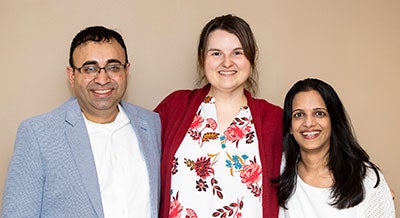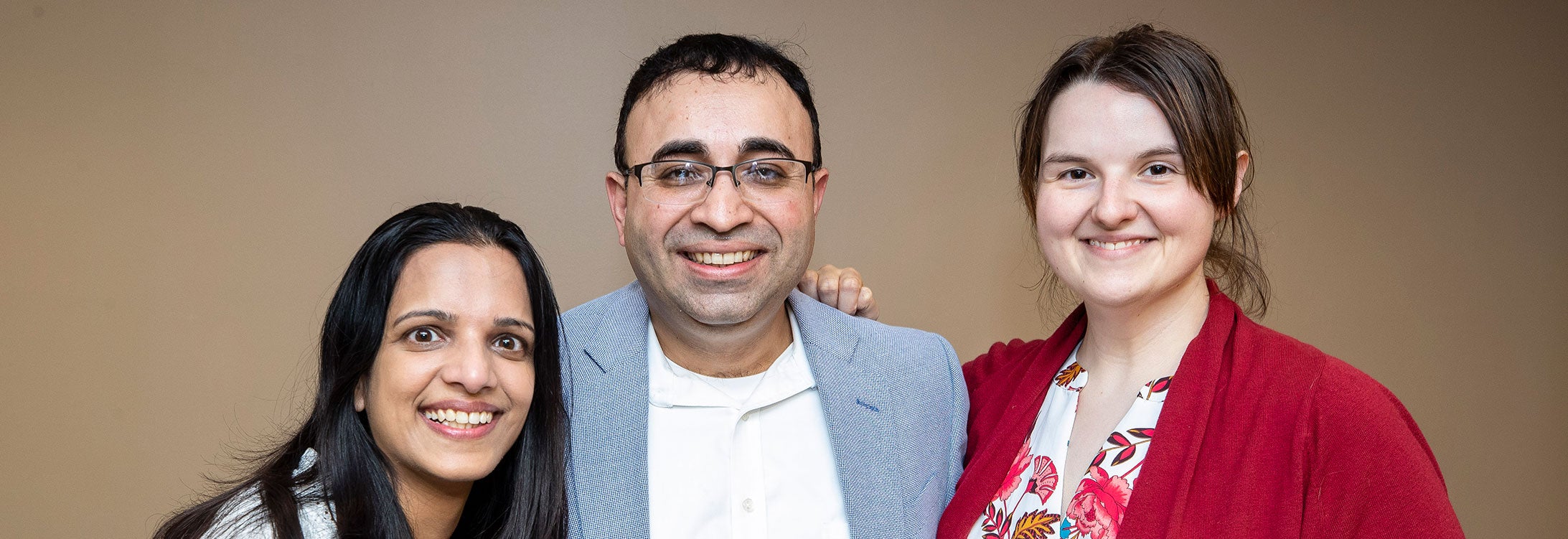ECU MAKES MINDGAMES FINALS
ECU team top qualifier for finals of national psychiatry competition
A team of East Carolina University psychiatry residents training at Vidant Medical Center was the top qualifier for the finals of a nationwide competition organized by the American Psychiatric Association.
Out of more than 100 residency programs throughout the United States that entered the annual MindGames competition, ECU’s team of residents was one of only three to advance to the May 5 finals at the Javits Center in New York City. Teams from Duke University and the University of Alabama at Birmingham were the second- and third-place qualifiers, respectively.

ECU’s team of psychiatry will compete in the finals of the APA’s nationwide MindGames competition in New York City on May 5.
The preliminary round of the MindGames competition is an online test that requires the teams to answer 100 psychiatry board exam-style questions in an hour. The questions covered a wide range of topics spanning across board psychiatry and some areas of neurology, psychopharmacology, psychopathology, child developmental psychiatry, cultural psychology and alternative treatments.
“It’s mostly knowledge based, but there was some other stuff from research articles and journals, so we needed to keep updated on the material,” said Dr. Roopma Wadhwa, a member of ECU’s team who is focusing on adult psychiatry.
The team members – Wadhwa, Dr. Rachel Gooding, team captain Dr. Vikas Gupta and alternate Dr. Rachel Bronsther – were notified on Jan. 22 that they earned a spot on the team based on their scores on the annual Psychiatry Resident-In-Training Examination (PRITE).
They then had a few weeks to prepare for the preliminary round of the competition.
“Rachel took the task of looking at the old PRITEs, Roopma took the task of looking at journal articles and I took the task of looking at FOCUS review,” said Gupta, a child and adolescent psychiatry resident. “Then during the exam, we would kind of talk together as a team and see who was most convinced about their answer and then follow their lead essentially.”
The team’s dynamic worked well enough for them to not only reach the contest’s finals, but to do so as the top overall qualifier.
“I was shocked,” said Gooding, an internal medicine – psychiatry resident. “I honestly wasn’t expecting that. After we took the test, the first thing I thought was, ‘Oh boy, I need to study.’”
ECU started competing in MindGames in 2014 and has had two other teams crack the top 10 on the MindGames qualifier list since then, but this year’s team was the first to reach the finals.
“My fellow program directors, Dr. Michael Lang, Dr. Nadyah John, and I are all extremely proud of the success of this team of residents,” said Dr. Toni Johnson, a clinical associate professor in the Department of Psychiatry and Behavioral Medicine at ECU’s Brody School of Medicine.
“Together, we provide a supportive and unique learning environment,” Johnson added. “We are a family at ECU so, when our students and residents succeed, we all succeed.”
The final round of the MindGames competition is a Jeopardy-style trivia contest that will take place during the first day of APA’s annual meeting at the Javits Center. While the preliminary round was more fact-based, textbook psychiatry questions, the MindGames final round is often more generalized and fun-filled.
“Knowing the content is one thing,” Wadhwa said. “But time management and being very efficient and pressing the buzzer also make a big difference.”
Even though the ECU team was the top qualifier, the team members still feel they face an uphill battle the finals.
“Duke and UAB are really well-established residency and research departments,” Gupta said.
“Everybody knows them. So I do think that we’ll probably be considered the underdog,” Gooding said. “We don’t get as much national recognition as the other teams, but that doesn’t mean we’re not got getting a good education and don’t know what we’re doing out here in eastern North Carolina.”
